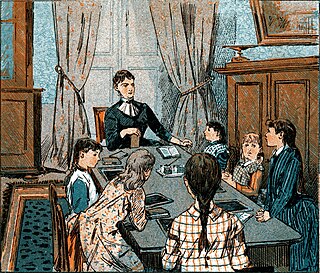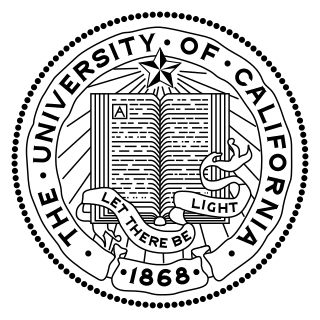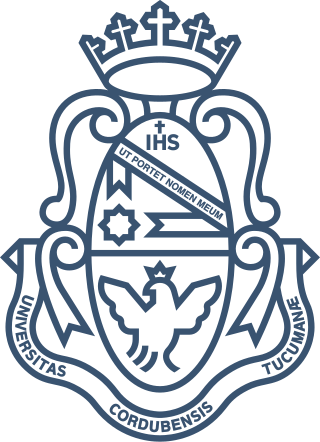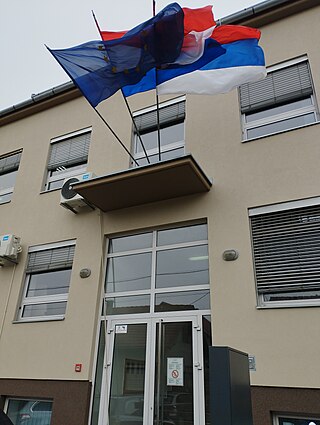
Catalonia is an autonomous community of Spain, designated as a nationality by its Statute of Autonomy. Most of its territory is situated on the northeast of the Iberian Peninsula, to the south of the Pyrenees mountain range. Catalonia is administratively divided into four provinces or eight vegueries (regions), which are in turn divided into 42 comarques. The capital and largest city, Barcelona, is the second-most populous municipality in Spain and the fifth-most populous urban area in the European Union.

Homeschooling or home schooling, also known as home education or elective home education (EHE), is the education of school-aged children at home or a variety of places other than a school. Usually conducted by a parent, tutor, or online teacher, many homeschool families use less formal, more personalized and individualized methods of learning that are not always found in schools. The actual practice of homeschooling varies considerably. The spectrum ranges from highly structured forms based on traditional school lessons to more open, free forms such as unschooling, which is a lesson- and curriculum-free implementation of homeschooling. Some families who initially attended a school go through a deschool phase to break away from school habits and prepare for homeschooling. While "homeschooling" is the term commonly used in North America, "home education" is primarily used in Europe and many Commonwealth countries. Homeschooling should not be confused with distance education, which generally refers to the arrangement where the student is educated by and conforms to the requirements of an online school, rather than being educated independently and unrestrictedly by their parents or by themselves.

The politics of Spain takes place under the framework established by the Constitution of 1978. Spain is established as a social and democratic sovereign country wherein the national sovereignty is vested in the people, from which the powers of the state emanate.

The University of California (UC) is a public land-grant research university system in the U.S. state of California. Headquartered in Oakland, the system is composed of its ten campuses at Berkeley, Davis, Irvine, Los Angeles, Merced, Riverside, San Diego, San Francisco, Santa Barbara, and Santa Cruz, along with numerous research centers and academic centers abroad. The system is the state's land-grant university.

The University of the Philippines is a state university system in the Philippines. It is the country's national university, as mandated by Republic Act No. 9500, giving it institutional autonomy.
In developmental psychology and moral, political, and bioethical philosophy, autonomy is the capacity to make an informed, uncoerced decision. Autonomous organizations or institutions are independent or self-governing. Autonomy can also be defined from a human resources perspective, where it denotes a level of discretion granted to an employee in his or her work. In such cases, autonomy is known to generally increase job satisfaction. Self-actualized individuals are thought to operate autonomously of external expectations. In a medical context, respect for a patient's personal autonomy is considered one of many fundamental ethical principles in medicine.
The Generalitat de Catalunya, or the Government of Catalonia, is the institutional system by which Catalonia is self-governed as an autonomous community of Spain. It is made up of the Parliament of Catalonia, the President of the Government of Catalonia, and the Executive Council of Catalonia. Its current powers are set out in the Statute of Autonomy of Catalonia of 2006.

Veermata Jijabai Technological Institute (VJTI) is a state funded college located in Mumbai, Maharashtra, India. Founded in 1887 and formerly known as the Victoria Jubilee Technical Institute, it adopted its present name on 26 January 1997. VJTI is an academically and administratively autonomous institute, but it is affiliated to the University of Mumbai. The institute is financially supported by the Government of Maharashtra.

The republics are one type of federal subject of the Russian Federation. 21 republics are internationally recognized as part of Russia; another is under its de facto control. The original republics were created as nation states for ethnic minorities. The indigenous ethnicity that gives its name to the republic is called the titular nationality. However, due to centuries of Russian migration, a titular nationality may not be a majority of its republic's population. By 2017, the autonomous status of all republics was formally abolished, making the republics politically equivalent to the other federal subjects of Russia.
An autonomous administrative division is a subnational administrative division or internal territory of a sovereign state that has a degree of autonomy — self-governance — under the national government. Autonomous areas are distinct from the constituent units of a federation in that they possess unique powers for their given circumstances. Typically, it is either geographically distinct from the rest of the state or populated by a national minority, which may exercise home rule. Decentralization of self-governing powers and functions to such divisions is a way for a national government to try to increase democratic participation or administrative efficiency or to defuse internal conflicts. States that include autonomous areas may be federacies, federations, or confederations. Autonomous areas can be divided into territorial autonomies, subregional territorial autonomies, and local autonomies.

The Autonomous University of Madrid, commonly known as la Autónoma, is a Spanish public university located in Madrid, Spain. The university was founded in 1968 by royal decree. UAM is widely respected as one of the most prestigious universities in Europe. According to the QS World University Rankings 2022, UAM is ranked as the top university in Spain and has consistently ranked as #1 in Spain in the El Pais University rankings, published annually. Among its notable alumni, which include every president that the Supreme Court of Spain and Constitutional Court of Spain has had, is the current King of Spain, Felipe VI, who studied the Licenciatura en Derecho (Law) and is the president of UAM’s alumni society.

Education in Bangladesh is administered by the country's Ministry of Education. The Ministry of Primary and Mass Education implements policies for primary education and state-funded schools at a local level. Education in Bangladesh is compulsory for all citizens until the end of grade eight. Primary and Secondary education is funded by the state and free of charge in public schools.

The Higher Education Commission is a statutory body formed by the Government of Pakistan which was established in 2002 under the Chairmanship of Atta-ur-Rahman. Its main functions are funding, overseeing, regulating and accrediting the higher education institutions in the country.

The National University of Córdoba, is a public university located in the city of Córdoba, Argentina. Founded in 1613, the university is the oldest in Argentina, the third oldest university of the Americas, with the first university being the National University of San Marcos and the second one, Saint Thomas Aquinas University.
Ayya Nadar Janaki Ammal College (ANJAC) is an autonomous college in Sivakasi, in the Indian state of Tamil Nadu, affiliated to Madurai Kamaraj University, Madurai recognized as a 'College of Excellence' by the University Grants Commission.

The Basque Country, also called the Basque Autonomous Community, is an autonomous community in northern Spain. It includes the Basque provinces of Álava, Biscay, and Gipuzkoa. It also surrounds an enclave called Treviño, which belongs to the neighboring autonomous community of Castile and León.

The Joint Council of Municipalities in Croatia is an elected consultative sui generis body which constitutes a form of cultural self-government of Serbs in the eastern Croatian Podunavlje region. The body was established in the initial aftermath of the Croatian War of Independence as a part of the international community's efforts to peacefully settle the conflict in self-proclaimed Eastern Slavonia, Baranya and Western Syrmia. The establishment of the ZVO was one of the explicit provisions of the Erdut Agreement which called upon the United Nations to establish its UNTAES transitional administration.

The Autonomous Administration of North and East Syria (AANES), also known as Rojava, is a de facto autonomous region in northeastern Syria. It consists of self-governing sub-regions in the areas of Afrin, Jazira, Euphrates, Raqqa, Tabqa, Manbij, and Deir Ez-Zor. The region gained its de facto autonomy in 2012 in the context of the ongoing Rojava conflict and the wider Syrian civil war, in which its official military force, the Syrian Democratic Forces (SDF), has taken part.

India has the largest numbers of engineers as well as the largest number of engineering education institutes and infrastructure in the world. As of 2021, India annually produces 1.5 million engineering graduates. India's technical education infrastructure includes 2500 engineering colleges, 1400 polytechnics and 200 schools of planning and architecture.














